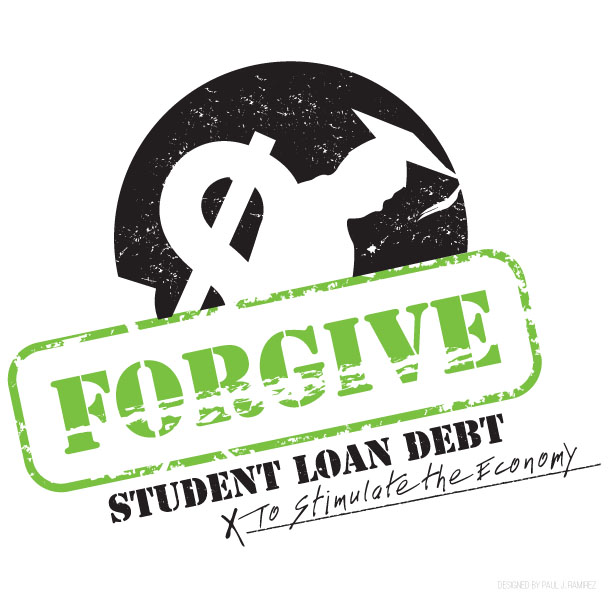After writing an article on forgiving student loan debt as a way to stimulate the economy I was alerted to the fact that Robert Applebaum has a website dedicated to this cause. The following interview with Robert Applebaum takes us deeper into what millions of Americans are facing in trying to repay their student loans.
BG: What are your thoughts about President Obama's announcement regarding easing the student loan debt burden for current graduates? Is he going far enough or is this just a baby step forward?

Photo by J.C. Rice
RA: President Obama's recent announcement was little more than a baby step on a journey of a thousand miles, however, I don't blame him for the shortcomings of his plan -- his announcement merely highlighted, for me at least, the limits of unilateral executive power. The president can only do so much on his own, without a Congress willing to do the job it was elected to do.
Congressional Republicans have made it abundantly clear that their sole priority is the defeat of Barack Obama for a second term. All other issues are secondary to that singular goal and, as such, they're ignoring not only the will of the people, but the needs of the people at a unique time in our history when we need everybody working towards the common good of all. Ideological purity is fine for lecture halls and think tanks -- not so much for a nation of 310 Million people who are truly suffering in the wake of 30 years of failed economic policies.
BG: The writings of Catherine Austin Fitts have opened my eyes to how Sallie Mae and others have restructured their systems with fraudulent inducements to make greater profits off of students who never pay off their loans. Why did you decide to found ForgiveStudentLoanDebt.com?
RA: I was extremely frustrated by the terms of the debate over the proposed "Obama Stimulus Plan" in January of 2009. A mere nine days after the inauguration of a man ushered in on a platform of hope and change, and there we were talking about more of the very same corporate welfare/tax cuts/trickle-down economics that anyone with the ability to read a graph knows full well has been an abysmal failure for the middle class.
At the time, I had never blogged, so I wrote an essay which essentially said "You want to stimulate economic growth? Great -- here's a better, more efficient way of accomplishing that goal rather than handing over trillions of dollars to the very financial institutions that cause the economic mess in the first place." I then posted that essay to a new group I created on Facebook and, within days, the group started to go viral. Eventually, membership peaked at about 290,000 members before Facebook decided to archive "old-format" groups.
I started the website a couple of months after starting the original Facebook group merely as a way of breaking though the Facebook bubble. As popular as Facebook may be, there are still millions of Americans who don't use it and, as such, i wanted to be able to reach them with my message of student loan forgiveness as a means of economic stimulus as well.
BG: How have the economic events since you founded ForgiveStudentLoanDebt.com affected your mission and the public's response to your mission?
RA: The proposal I put forth started out as an alternative economic stimulus plan -- nothing more. In fact, I wasn't even aware of most of the inequities that existed in the student loan market when I first made the proposal -- I merely wanted to offer a better way of stimulating economic growth that didn't throw good money after bad and which didn't reward bad behavior. Unfortunately, the economic climate has only worsened in the 2.5 years since first putting forth my proposal and, as such, the ever-growing membership of the movement played a big part in helping to morph what started out as a simple economic stimulus plan into a much broader movement for overall student loan reform.
The debt ceiling debacle of last summer really cemented the views of most of the membership that the regressive right has driven the crazy train off a cliff, from which there's no coming back. The American people rejected their failed economic policies in both 2006 and 2008, yet their only solutions to the crisis that they created are just more of the same type of failed policies of coddling the rich while ignoring the plight of the poor and middle class.
As it's become more and more clear to those who follow me that fundamental change won't be an easy sell, they've only become that much more emboldened to elect people that truly represent their interests instead of career politicians who pander to their demands and then belly up to the trough once they're in office.
The American people have had enough and there's no better indication of that than the Occupy protests happening all across the country. The American people know that the system is rigged against them and they're not going to take it any longer. To that, I say: It's about damn time!
BG: The main argument I've read against forgiving student loan debts is that it's allowing people to be irresponsible. I see this more as being a way to help individual Americans in similar ways that we help Third World countries buried in debt that in reality will never be fully paid. Do you think that forgiving student loan debt is irresponsible?
RA: It's not the students who were irresponsible, it was Congress, the lenders and the colleges and universities who preyed upon students for decades under the guise of giving access to higher education to those who could otherwise not afford it who are the real irresponsible actors here. Tuition rates have skyrocketed at unconscionable rates and, therefore, by way of example, someone seeking an engineering degree today is required to pay at least four times the amount someone else who sought the very same degree 30 or 40 years ago to obtain that degree, yet their earning potential with such degree is significantly less.
The job market is flooded with talent, there just aren't enough jobs to go around to retroactively make the decision to obtain a higher education cost-effective. Most of those who've graduated into the worst job market since the Great Depression didn't have crystal balls into which they could look and realize that the greed of those at the very top would result in the near-destruction of the economy for all (except, conveniently, for those already at the very top).
Hindsight is 20/20, however, most people who attend college do so with the expectation that an advanced degree equates with higher earnings and excellent job prospects that would allow for relatively easy repayment of their student loan debts. What they're finding out, however, is that they were sold a bill of goods and now they're the ones left holding the bag. Therefore, it is my opinion that NOT forgiving student loan debt would be the irresponsible course of action, given how badly this economy has deteriorated, with no signs of improvement on the horizon.
BG: Many people I know with student loan debts owe double or more on them today after years of paying the minimum fee. How has compound interest on these loans led to them growing so exorbitantly for people who can't afford to pay more than their minimum payments?
RA: Compounded interest is a tool that would make the mob envious. It's legalized usury and it's responsible for raping and pillaging the middle class. Most people have absolutely no problem paying back what they borrowed, plus reasonable interest. What they have a problem with is paying back three, four, five times or more than what they borrowed, thanks to the racket of compounding, or capitalized interest.
The lenders have taken this unconscionable tool and used it to indenture millions of Americans to their educational debts. If a borrower misses a payment, penalties of up to 25% of the principal can be tacked on, which is then capitalized, and if the loan goes into collections for whatever reason, up to another 25% can be tacked on by the collections agencies, also subject to capitalization, causing these loans to balloon to such enormous levels that full repayment of the debt becomes a near-impossibility short of winning the lottery.
These are the very same lenders, by the way, who issued loans to anyone with a pulse who wanted one -- regardless of what the prospective student planned on studying, whether the career field they were pursuing had enough well-paying jobs to allow the student to repay their loans and without any regard for the effects such loans would have on the borrower.
They didn't care when they issued the loans and they don't care now because, thanks to their bought-and-paid-for cronies in Congress, they're shielded from ANY and ALL risk in issuing these loans. The very necessary checks on the power of lenders, such as bankruptcy protections and statutes of limitations on the collections of student loan debt, have been curiously stripped away, leaving student loan debt in a class all its own.
Thus, while you can have your mortgage, credit card, business or even your gambling debts discharged or restructured in Bankruptcy, student loan debt is with you until you pay it off or you die -- and sometimes beyond.
BG: What's the most important thing you would like people to understand about the issue of forgiving student loan debt to stimulate the economy?

RA: That the $1 trillion student debt bubble isn't going away any time soon. I don't expect 100% agreement with what I've proposed, however, if you disagree with my solution, then what's yours? To the extent we continue to ignore this problem, we are doomed to continue spinning our wheels in a stagnant economy.
Because of these debts, people are not buying homes, not starting businesses or families,not inventing, investing, innovating, or otherwise taking economic risks -- all of the very things we need all Americans to be doing right now if we're ever to dig ourselves out of the enormous hole created by the greed of those at the very top.
One other message I wish to convey: this isn't a problem that only affects 20-somethings. In fact, approximately half of the 650,000 people who follow my efforts and who have signed my petition are over the age of 30. Many are in their 40s, 50s, 60s and beyond (For proof of this, please visit our new online photo journal project, www.occupystudentdebt.com, that ForgiveStudentLoanDebt.com has undertaken with the folks behind the film Default: The Student Loan Documentary, premiering this month on PBS -- check your local listings!).
This is an issue that cuts across all generational, geographical, political and cultural lines. The middle class is the engine that drives our economy and, right now, that engine is stalled. Extraordinary times call for extraordinary measures and if anyone, particularly those in positions of power, believes that student loan forgiveness isn't the answer, then I submit that it's incumbent upon such person to come up with their own solution to the problem because, like I said, not only isn't it going away, but it's getting exponentially worse by the minute.
